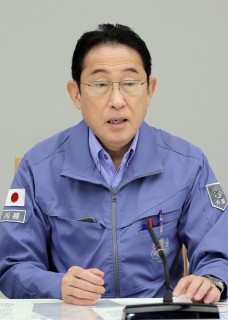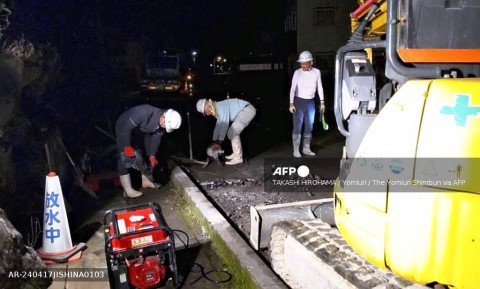

Japan plans to double a fund used for disaster relief and other contingencies to $6.8 billion after a devastating New Year’s Day earthquake, the government said Tuesday, as snow worsened conditions for survivors.
The 7.5-magnitude quake and powerful aftershocks killed at least 222 people in central Japan, laying waste to houses and infrastructure.
In the Ishikawa region on the Sea of Japan coast, about 16,700 people were still stuck in limbo in shelters, many without running water.
“Uninterrupted support is necessary for the reconstruction and recovery of the disaster-hit areas,” Hiroshi Moriya, deputy chief cabinet secretary, told reporters.
In the fiscal year from April, the government will raise its reserve fund — used for emergencies from disasters to economic downturns — from 500 billion yen ($3.4 billion) to one trillion yen ($6.8 billion), he said.
The revised draft budget is expected to be approved by ministers later Tuesday and will then be submitted to parliament for enactment.
Separately, around 100 billion yen ($680 million) from the current fiscal year’s reserve fund was set to be earmarked for a relief package for the New Year’s Day quake, he added.
Fears are rising of further deaths due to worsening health conditions in shelters as a cold front blankets the coast in snow.
TV footage showed a long line of evacuees with heavy coats and umbrellas waiting for food rations, while others sifted through donated winter clothing.
Officials are trying to move people to secondary shelters in other regions with water, electricity and heaters, but progress has been slow.
On Tuesday, the quake-ravaged city of Wajima said it had made prolonged accommodation arrangements for displaced residents at hotels elsewhere in the country.
“Our infrastructure has been decimated, and full-fledged reconstruction is still nowhere in sight,” the city said in a statement.
Even so, analysts said the impact of the disaster on Japan’s economy will likely be limited, as the earthquake struck a remote area with few industrial sites.
Takahide Kiuchi, an economist at the Nomura Research Institute, evaluated the cost of material damage at around 800 billion yen ($5.5 billion) in a preliminary estimate.
That figure represents only 0.15 percent of the country’s GDP, and less than five percent of the damage cost of the huge earthquake and tsunami that devastated northeastern Japan in 2011.

